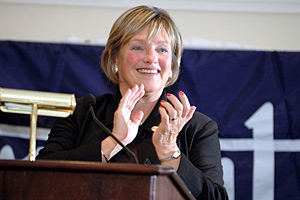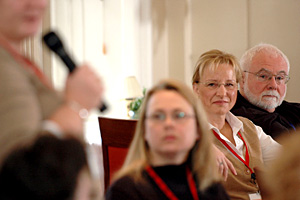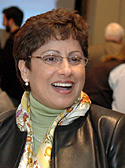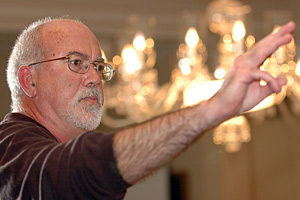Ruben Rangel learned a key concept of unionism at a very young age in his farmworker family.
"I was three years old picking potatoes, where my mother was dragging around a 100-pound sack," said Rangel, an adjunct professor at the Borough of Manhattan Community College. The toddler brought a little plastic pail full of potatoes to dump in his mother's sack.
"I realized from that moment on that the people who work the hardest seem to get the least recognition," he told a session of first-time participants at NYSUT's annual conference for community college members in Cooperstown, Otsego County.
"Early on, I had this misconception that it would be different with college," Rangel added. Now he is active in the Professional Staff Congress trying to improve conditions for part-time professors, or "subway profs," as he termed himself and his colleagues.

The first-timer session was led by Ellen Schuler Mauk, who represents community college members on the NYSUT Board of Directors. Schuler Mauk, the president of the Faculty Association of Suffolk CC, asked participants to articulate their "union moments," seminal experiences when the importance of unions became clear.
Anna Halligan of the Broome CC Faculty Association reminisced about being five years old in a family of Irish immigrants in England. Her father sustained an on-the-job injury while working for a company that contracted with British Railways. She remembered a meeting of her father and a lawyer for the railways to discuss disability benefits (and lack thereof) where the lawyer called her father Tom and her father called the lawyer "Mister So-and-So."

"I figured out early on that the only way a working person can have any justice is through a union," she said.
 NYSUT Vice President Maria Neira recalled her early days of teaching, "crying every day." Her father, a shop steward in his union, suggested she talk to her union rep.
NYSUT Vice President Maria Neira recalled her early days of teaching, "crying every day." Her father, a shop steward in his union, suggested she talk to her union rep.
Neira discovered there was no union rep at the school because the teachers were afraid of an authoritarian principal. One day soon after that, Neira said, "I went in and became the union rep."
Fiery
The keynoter of the conference was Stewart Acuff, director of organizing for the national AFL-CIO. He gave a fiery speech about the need to counter the assault on unions by the Bush administration and its ideological fellow travelers. Mary Nowyj was so inspired that she arranged with Acuff afterwards to get a DVD of one of his speeches to show to her public-speaking class at Onondaga CC.

In the last several weeks, Acuff said, there had been 60 anti-worker decisions by the National Labor Relations Board. This has spurred the AFL-CIO to schedule protest marches Nov. 15 in Washington and other cities around the country.
"We will demand that this labor board be closed for renovation," Acuff declared to an autumn storm of applause from the 150 participants at the conference.
Acuff pointed out that, based on Human Rights Watch using the NLRB's own statistics, at least 20,000 workers in America "were fired for exercising legally protected union-organizing rights" every year for the last 15.
"How does this happen in the land of the free?" Acuff said.
Solidarity, Acuff added, "is not a strategy - it's a principle. It is not a strategy - it is the foundation of our strength."